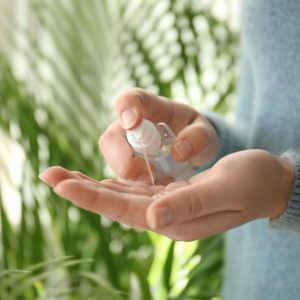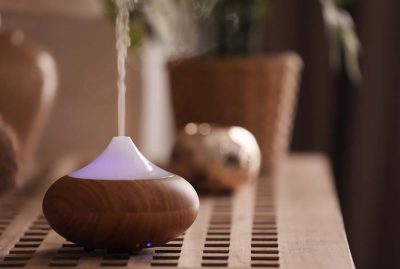Essential oils not only smell wonderful, but support our mental and physical well-being too. Indeed, researchers have proven that essential plant oils have a potent antimicrobial effect. For example, a study1 in an Italian hospital showed that the bacterial colonisation on surfaces such as tabletops and cabinet doors could be reduced by 90 and 75 percent respectively if, in addition to the normal cleaning measures, an aromatic oil mixture was evaporated in the rooms using an ultrasonic nebuliser. In addition, the amount of medication that had to be prescribed to the patients (mainly for infections and respiratory problems) as well as the duration of intake was up to 86 percent lower than for patients on the control floor, where the aromatic oils were not used.
We can also use this effect of essential oils in relation to the coronavirus. These essential oils are particularly recommended for protection:
- All conifer fragrances
- All citrus scents, especially orange and lemon
- Cajeput, eucalyptus globulus, coriander seeds, lavender fine , lemongrass, clove bud, peppermint, ravintsara, tea tree, thyme
Below we present some helpful recipes that you can easily blend yourself at home. Please make sure do use high quality oils.
Hygiene and care of skin and mucous membranes
When skin is dry, germs can more easily adhere. Through thorough hygiene and care of the skin and mucous membranes, the germs are not given a target and the risk of infection is reduced. Frequent and thorough hand washing and subsequent application of cream is good prevention. When travelling, a hand hygiene spray can be helpful, especially if you use public transport. The mucous membranes of the mouth and nose can additionally be treated with fatty plant oils and thus protected in a natural way.
Handsoap
12 drops of tea tree
20 drops of lavender fine
100 ml (3.5 oz) neutral liquid soap (natural cosmetics)
ABlend all ingredients
Soap hands thoroughly for 20 seconds and rinse with warm water
(If tea tree oil or lavender oil is not available, eucalyptus, thyme, cinnamon, clove oil, pine or orange can be used.)

Hand Hygiene Spray
5 – 8 drops of ravintsara (camphor tree)
5 – 8 drops of niauli
5 – 8 drops of lemon
All plant waters (e.g. rose, witch hazel or lavender water) or a simple alcohol-water blend (5 ml [0.2 oz] vodka or ethyl alcohol, 25 ml [0.9 oz] distilled water) are suitable as a basis for the mixture. Add the essential oils to the plant water or alcohol-water blend, fill into a spray bottle. Shake well before each application, spray directly onto the hands and rub in.
(If ravintsara or niauli oil is not available, eucalyptus, thyme, cinnamon oil, clove oil, stone pine or tea tree can also be used.)
Nasal Care Oil
2 drops of ravintsara
2 drops of orange
10 ml [0.4 oz] almond oil or sesame oil
Mix the essential oils with the almond or sesame oil and apply several times a day for protective nasal care with a cotton wool pad in the nasal cavity.
Nasal Care Balm
10 drops of niauli
10 drops of lavender fine
25 ml [0.9 oz] Shea butter or coconut oil
Stir the essential oils into slightly warmed shea butter and apply regularly around the nostrils. Use clean fingers or a clean spoon to apply.
(If ravintsara or niauli oil is not available, eucalyptus, thyme, a conifer oil or tea tree oil can also be used.)
Oral care oil (for an oil swishing cure to detoxify the body and for a healthy oral flora)
3 drops of clove bud
9 drops of mountain pine, alternatively tea tree, peppermint, caraway oil
9 drops of orange or lemon
100 ml [3.5 oz] organic sesame oil (or olive oil, flaxseed oil, coconut oil)
Blend essential oils into the base oil and move 1 tablespoon of it in your mouth for about 2 minutes and suck it through your teeth. Then spit into a tissue and dispose of in the trash.

Protection through targeted inhalation of essential oils
Through direct inhalation of the essential oils, the scent molecules attach themselves to the mucous membranes and can immediately exert their germ-reducing effect there.
There are many possible applications for direct smelling:
- Put 1 drop of essential oil on a face mask or tissue and smell it
- Felt, wool or fabric are suitable as creative scent carriers: apply 1 drop of essential oil and fix it near the neck, e.g. on the collar
By scenting the rooms in which we stay, the germs in the air we breathe are reduced. This can be achieved by nebulising various essential oils, but also by the rapid application of room sprays (same blending principle as with the hand hygiene spray). The following fragrance blend is recommended for use in the aroma nebuliser (diffuser) or fragrance lamp:
Room scent base blend
20 drops of lemon
20 drops of orange
10 drops of stone pine
10 drops of eucalyptus
5 drops of lemongrass
Blend the essential oils in an empty bottle and add 5 to 8 drops to the fragrance lamp or the aroma nebuliser for room scenting (for room sizes of approx. 25m² [270 square feet]).
Reference:
1Gelmini F, Belotti L, Vecchi S, Testa C, Beretta G. Air dispersed essential oils combined with standard sanitization procedures for environmental microbiota control in nosocomial hospitalization rooms. Compl Ther Med 2016; 25: 113-119








